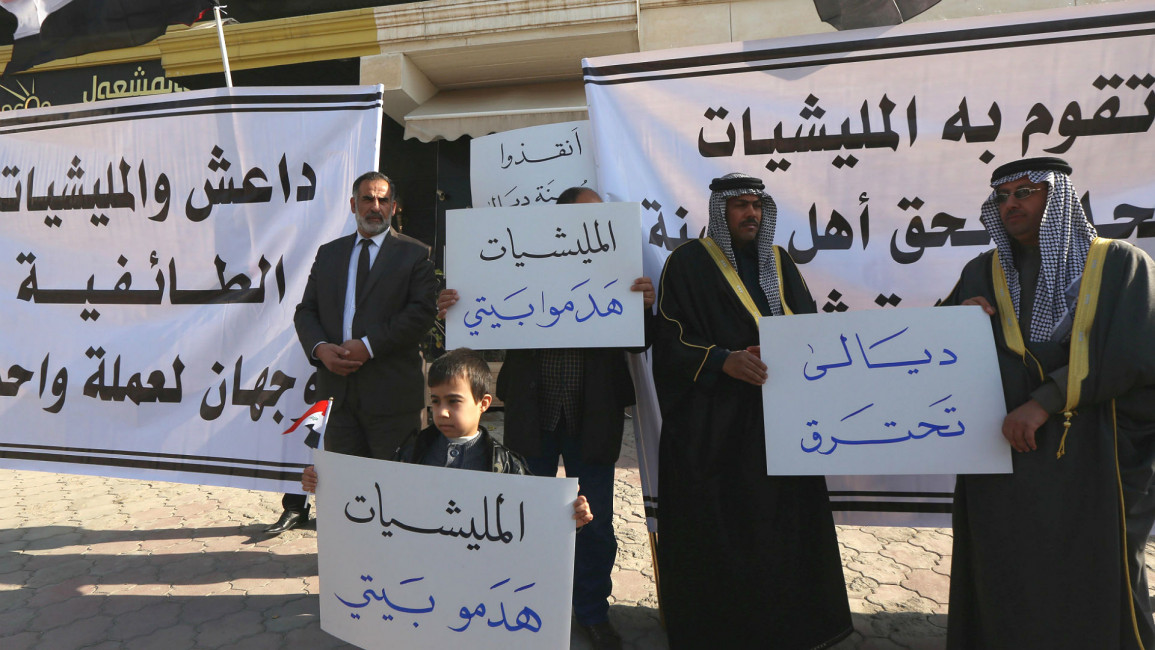Iraqi pro government militias committing 'harrowing abuses'
Abuses by militias allied with Iraqi security forces in Sunni areas have escalated in recent months, Human Rights Watch said in a new briefing.
Residents have been forced from their homes, kidnapped, and in some cases summarily executed. At least 3,000 people have fled their homes in the Muqdadiyya area of Diyala province since June 2014 and, since October, been prevented from returning.
The rights group says that it is conducting an investigation into more recent allegations that militia and SWAT forces killed 72 civilians in the town of Barwana, also in Muqdadiyya.
Residents told Human Rights Watch that security forces and allied militias began to harass residents in the vicinity of Muqdadiyya, an area 80 kilometres northeast of Baghdad in June, shortly after the extremist group Islamic State (known also as ISIS and IS) took over Mosul. The abuses escalated around October, witnesses said, the month after Haider al-Abadi took over as prime minister, pledging to rein in abusive militias and to end the sectarianism that fed the cycle of violence under his predecessor.
“Iraqi civilians are being hammered by ISIS and then by pro-government militias in areas they seize from ISIS,” said Joe Stork, deputy Middle East and North Africa director. “With the government responding to those they deem terrorists with arbitrary arrests and executions, residents have nowhere to turn for protection.”
Harrowing accounts of abuse
One of the caes highlighted by Human Rights Watch was that of a 70-year-old resident of al-Bulour village in Muqdadiyya, who identified herself as Um Mariam.
She told investigators that on December 8, 2014, Muqdadiyya police took her sons, Karim, 33, and Seif, 38, from their home without an arrest warrant.
“They burst into the house and grabbed them,” she said. They released the men, who Um Mariam said were civilians, two days later.
But at about 3:30 p.m. on December 12, as their mother watched them approach the al-Bulour checkpoint on their return home, six armed men wearing black or camouflage with their faces covered grabbed the two men.
The armed men pushed Um Mariam and threatened to shoot her if she screamed: “I was kissing their hands to make them stop, and they just kicked me off of them,” she said. Immediately afterward, Um Mariam went to file a complaint with the police station commander, who told her the police “couldn’t do anything” about the abduction, she said.
Another brother, Abu Yousif, told Human Rights Watch that unknown men called him shortly afterward and told him his brothers were dead: “Come take your dogs,” they said. “We shot each of them ten times in the chest and threw their bodies.”
Um Mariam and Abu Yousif then fled to Khanaqin, an area in northern Diyala under both Kurdish peshmerga and militia control.
On December 18, 2014, the Wall Street Journal quoted Prime Minister al-Abadi as pledgeing to “bring … all armed groups under state control. No armed groups or militias will work outside or parallel to the Iraqi Security Forces.”
In addition to ordering a public investigation into the killings in Barwana, al-Abadi orderd an investigation into allegations that security forces extrajudicially killed two Sunni civilians in Anbar and has strongly condemned unlawful conduct by militias and security forces.
The evidence that militias are leading security operations in Salah al-Din, Diyala, Baghdad, and Babel provinces belie this pledge, Human Rights Watch said.
“The Iraqi government and its international allies need to take account of the militia scourge that is devastating places like Muqdadiyya,” Stork said. “Any effective response to ISIS should start with protecting civilian lives and holding those who abuse them to account, especially in areas where people have already suffered from ISIS occupation and attacks.”
Human Rights Watch spoke to victims and witnesses from Muqdadiyya, most of whom have fled their homes, by telephone between January 8 and January 15, 2015. All the names used are pseudonyms.


![President Pezeshkian has denounced Israel's attacks on Lebanon [Getty]](/sites/default/files/styles/image_684x385/public/2173482924.jpeg?h=a5f2f23a&itok=q3evVtko)



 Follow the Middle East's top stories in English at The New Arab on Google News
Follow the Middle East's top stories in English at The New Arab on Google News


